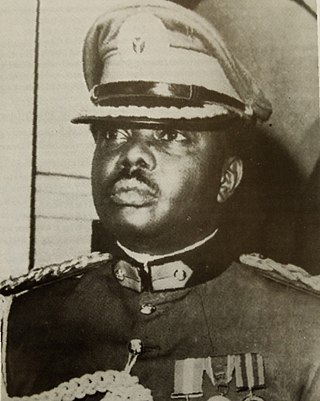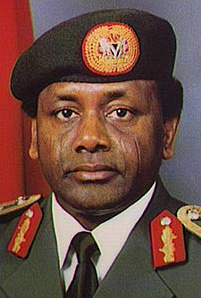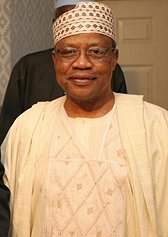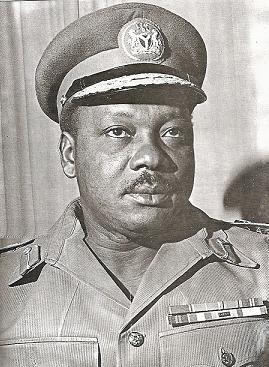
Murtala Ramat Muhammed ; 8 November 1938 – 13 February 1976) was a Nigerian military officer and the fourth head of state of Nigeria. He led the 1966 Nigerian counter-coup in overthrowing the military regime of Johnson Aguiyi-Ironsi and featured prominently during the Nigerian Civil War and thereafter ruled Nigeria from 29 July 1975 until his assassination on 13 February 1976. This period in Nigerian history, from the Northern counter-coup victory to Murtala's death, is commonly associated with the institutionalization of the military in Nigerian politics.

Sani Abacha ; was a Nigerian military dictator and statesman who ruled Nigeria as the military head of state from 1993 following a palace coup d'état until his sudden death in 1998.

The president of Nigeria, officially the president of the Federal Republic of Nigeria, is the head of state and head of government of the Federal Republic of Nigeria. The president directs the executive branch of the Federal Government and is the commander-in-chief of the Nigerian Armed Forces.

Ibrahim Badamasi Babangida is a Nigerian statesman and military dictator who ruled as military president of Nigeria from 1985 when he orchestrated a coup d'état against his military and political arch-rival Muhammadu Buhari, until his resignation in 1993 as a result of the post-12 June 1993 election which he illegally nullified.

Yakubu Dan-Yumma "Jack" Gowon is a Nigerian former Head of State and statesman who led the Federal military government war efforts during the Nigerian Civil War.

Johnson Thomas Umunnakwe Aguiyi-Ironsi was a Nigerian general who was the first military head of state of Nigeria. He was appointed to head the country after the 15 January 1966 military coup.

The vice president of Nigeria is the second-highest official in the executive branch of the federal government of Nigeria, after the president of Nigeria, and ranks first in the presidential line of succession. Officially styled Vice President of the Federal Republic of Nigeria, the vice president is directly elected together with the president to a four-year term of office.

The military dictatorship in Nigeria was a period when members of the Nigerian Armed Forces held power in Nigeria from 1966 to 1999 with an interregnum from 1979 to 1983. The military was able to rise to power often with the tacit support of the elite through coups d'état. Since the country became a republic in 1963, there had been a series of military coups.

The Third Republic was the planned republican government of Nigeria in 1992 which was to be governed by the Third Republican constitution. In the Third Republic, there were democratically elected state governors and state assemblies and a democratically elected federal legislature. The republic was however not fully democratic as there was no democratically elected civilian president. The then military president Ibrahim Babangida's supposed transition eventually turned out to be a ploy to keep executive powers and grant the National Assembly limited legislative powers. Hence all laws passed by the Senate and House of Representatives will have to pass the National Defence and Security Council of Nigeria and finally approved by the President. So while Babangida changed the usual style adopted by preceding military leaders from Head of State to president, he will continue to postpone presidential elections and eventually annul the ultimate one held on 12 June 1993. The Third Republic can thus be described as half military and half civilian.
Donaldson Oladipo Oyeyinka Diya, ; 3 April 1944 – 26 March 2023) was a Nigerian general and lawyer who served as Chief of General Staff under military head of state General Sani Abacha from 1994 until his arrest for treason in 1997. He also served as Chief of Defence Staff and as military governor of Ogun State from January 1984 to August 1985.
Okhai Michael Akhigbe was a vice admiral of the Nigerian Navy who served as de facto vice president of Nigeria under military head of state General Abdusalami Abubakar from June 1998 to May 1999, when the military government was terminated and replaced by the Fourth Nigerian Republic. He previously served as Chief of Naval Staff, the highest-ranking officer of the Nigerian Navy from 1994 to 1998; military governor of Lagos State from 1986 to 1988; and military governor of Ondo State from 1985 to 1986.
A series of massacres were committed against Igbo people and other people of southern Nigerian origin living in northern Nigeria starting in May 1966 and reaching a peak after 29 September 1966. Between 8,000 and 30,000 Igbos and easterners have been estimated to have been killed. A further 1 million Igbos fled the Northern Region into the East. In response to the killings some northerners were massacred in Port Harcourt and other eastern cities. These events led to the secession of the eastern Nigerian region and the declaration of the Republic of Biafra, which ultimately led to the Nigeria-Biafra war.
Abdulkareem Adisa was a Nigerian major general who was military governor of Oyo State during the military regime of General Ibrahim Babangida. He was convicted for involvement in an attempted coup against military head of state General Sani Abacha in 1997, and was on death row when Abacha died in June 1998. He was subsequently pardoned.
Aliyu Mohammed Gusau is a Nigerian general and statesman. He has held several high level national security, military and intelligence offices, and has participated in several military coups, playing a central role in founding the Fourth Nigerian Republic.
Abdullahi Mohammed is a retired Nigerian Army major general, who served as chief of staff to presidents Olusegun Obasanjo and Umaru Musa Yar'Adua from 1999 to 2008; National Security Adviser to General Abdusalami Abubakar from 1998 to 1999; Director General of the National Security Organization from 1976 to 1979; and Governor of Benue-Plateau State, Nigeria from July 1975 to February 1976 during the military regime of General Murtala Mohammed.
Since Nigeria became independent in 1960, there have been five military coups. Between 1966 and 1999, Nigeria was ruled by a military government without interruption, apart from a short-lived return to democracy under the Second Republic of 1979 to 1983. However, the most recent coup occurred in 1993, and there have been no significant further attempts under the Fourth Republic, which restored multi-party democracy in 1999.
On 15 January 1966, rebellious soldiers carrying out a military putsch led by Kaduna Nzeogwu and 4 others, killed 22 people including the prime minister of Nigeria, many senior politicians, senior Army officers and their wives, and sentinels on protective duty. The coup plotters attacked the cities of Kaduna, Ibadan, and Lagos while also blockading the Niger and Benue River within a two-day timespan, before being overcome by loyalist forces.

The 1993 Nigerian coup d'état was a bloodless military coup which took place in Nigeria on 17 November 1993 when the Armed Forces, headed by Defence Minister General Sani Abacha, forced Interim President Chief Ernest Shonekan to resign. Shonekan assumed the interim presidency on 26 August 1993, succeeding General Ibrahim Babangida as head of state, in the aftermath of Babangida's annulment of the 12 June 1993 presidential election. In a nationwide broadcast following the coup, Abacha cited the stagnant nature of Shonekan's government, and his inability to manage the democratic process in the country as a cause of his resignation. In September 1994, Abacha issued a decree that placed his government above the jurisdiction of the courts, effectively giving him absolute power. Another decree gave him the right to detain anyone for up to three months.

Général d’Armée Assimi Goïta is a Malian military officer who has been interim President of Mali since 28 May 2021. Goïta was the leader of the National Committee for the Salvation of the People, a military junta that seized power from former president Ibrahim Boubacar Keïta in the 2020 Malian coup d'état. Goïta later seized power from Bah Ndaw in the 2021 Malian coup d'état and has since been declared interim president of Mali.









